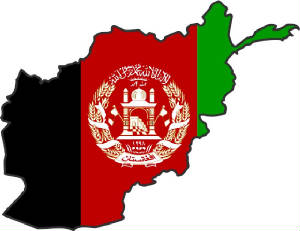|
History of Afghanistan
The history of Afghanistan
began to be recorded during the Achaemenid Empire, especially around 330 BCE
with the arrival of Alexander the Great and his Greek army after conquering
Persia. An advanced degree of urbanisation and culture had existed on the land
which is now the state of Afghanistan for many thousands of years. The nation
of Afghanistan was mentioned by the following names in history, Ariana, Arachosia,
and Khorasan. It is the land where many powerful kingdoms established their
capitals, including the Greco-Bactrians, Kushans,
Indo-Sassanids,
Kabul
Shahi, Saffarids, Samanids, Ghaznavids,
Ghurids,
Kartids, Timurids,
Mughals,
Hotakis,
and Durranis.On
many trade and migration routes, the land of Afghanistan is called "Central
Asian roundabout" since routes converged from the Tigris-Euphrates
Basin via the Iranian Plateau, from India through the passes over the Hindu
Kush, from the Far East via the Tarim Basin, and from the adjacent Eurasian
Steppe.

|
| Islamic Republic of Afghanistan. |
The Aryans who arrived to Afghanistan after the 20th century BCE left their languages (Pashto and Persian) and limited
culture, but it is the Middle Eastern influence (Persian and Arab invasions) that defined modern Afghanistan. Its Greek, Central
Asian nomadic, and Zoroastrian/Buddhist/Hindu past have long since vanished. Local empire builders such as the Ghaznavids,
Ghorids, and Timurids would continue to make Afghanistan a major medieval power as well as a center of learning that produced
Ferdowsi and Al-Biruni among many other academics and literary iconic figures. Although it was the scene of great empires and flourishing trade for over
two millennia, the area's heterogeneous groups, with Pashtuns predominant in the southern areas and Tajiks, Hazaras, Uzbeks,
Turkmen in the north make up the Afghan identity since the mid-18th century when Ahmad Shah Durrani united all the tribes
and formed the last Afghan Empire, which became the modern state of Afghanistan. In the nineteenth century, Afghanistan lay
between the expanding might of the Russian and British empires until 1919 when the state declared full independence over its
foreign affairs.
|

